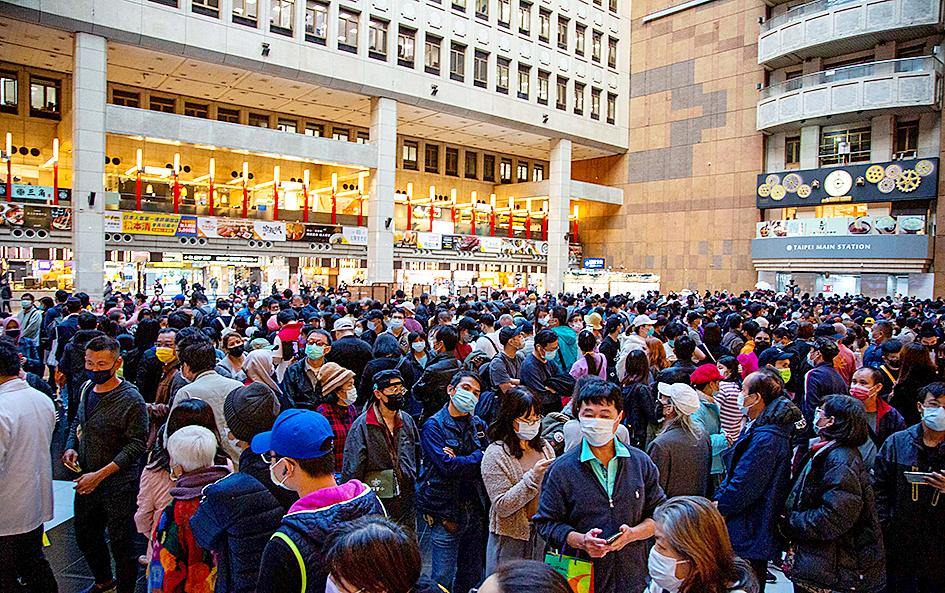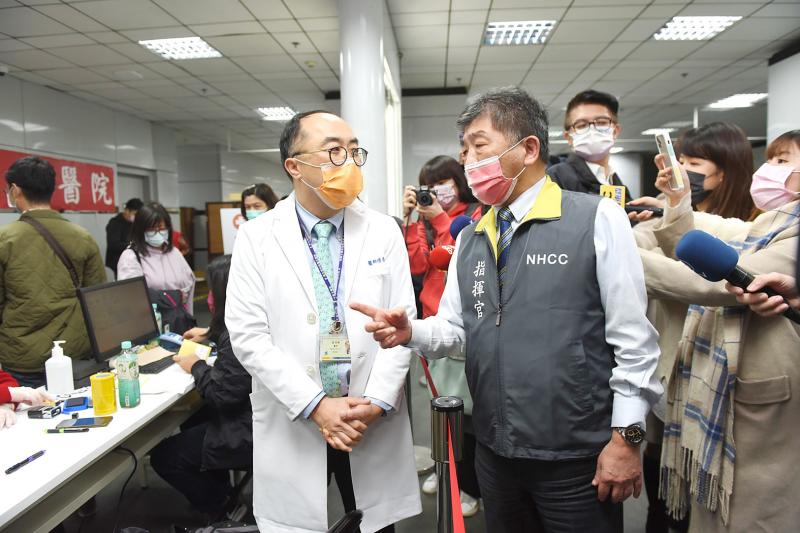Taiwan can be considered to have achieved “COVID zero” status, Minister of Health and Welfare Chen Shih-chung (陳時中) said yesterday, despite the Central Epidemic Command Center (CECC) reporting 21 imported cases of COVID-19, the highest number of daily imported infections reported this year.
Chen, who heads the CECC, said no local infections or deaths were reported, but 21 imported cases were confirmed yesterday.
The imported cases are eight men and 13 women who arrived from Belize, Cambodia, Indonesia, the Philippines, Singapore, Vietnam and the US, Chen said.

Photo courtesy of the Central Epidemic Command Center.
The highest number of daily imported infections last year was 25 cases on March 23, he said.
Centers for Disease Control (CDC) Deputy Director-General Philip Lo (羅一鈞), deputy head of the CECC’s medical response division, said that among the 21 imported cases, nine were migrant workers from Indonesia and five Bangladeshi sailors.
The five sailors arrived from Singapore and tested negative upon arrival, as well as upon ending quarantine, but they tested positive in self-paid tests on Monday after completing self-health management, Lo said.

Photo: CNA
However, they had low viral loads and had developed antibodies against COVID-19, while four of them tested negative in a second test yesterday, so they were likely previous infections that pose a low risk to the local community, he said.
As no local infections have been reported for 33 consecutive days, which exceeds two 14-day incubation periods of COVID-19, Taiwan can be considered to have achieved “COVID zero” status, Chen said, adding that this was the result of everyone’s disease prevention efforts.
However, cases are rising in many parts of the world, so Taiwan is expected to report more imported cases this month, he said, urging the public to continue cooperating with the CECC and complying with disease prevention regulations.
Asked to comment on Taiwan People’s Party Legislator Lai Hsiang-ling’s (賴香伶) remark yesterday that there are still more than 5 million people who have not received a dose of COVID-19 vaccine, Chen said there are about 2 million children younger than 12 years old who cannot get vaccinated, while there are about another 2 million currently overseas.
After the CECC on Monday reported that 34,000 doses of the Moderna vaccine were due to expire yesterday, Chen said that about 15,000 doses still needed to be administered yesterday, but with various gifts and gift certificates being offered to encourage people to get vaccinated, the CECC was optimistic that the remaining doses would not go to waste.
Chen and CDC officials yesterday visited a temporary vaccination center at Taipei Railway Station offering the Moderna vaccine to eligible recipients along with a NT$100 gift certificate.
Chen said that 808 doses had been administered at the station on Sunday, followed by 2,001 doses on Monday, and the goal for yesterday was to provide more than 3,500 doses.
With the main hall of the station crowded with people lining up to get vaccinated yesterday afternoon, a large proportion of them migrant workers, CDC Deputy Director-General Chuang Jen-hsiang (莊人祥), who is CECC spokesperson, said people who lined up before 8pm would be guaranteed to get a dose.
The CECC also announced that people can get vaccinated at Banciao Railway Station’s visitor center between 4:30pm and 8pm until Friday, and that a gift certificate would also be offered.

CHAOS: Iranians took to the streets playing celebratory music after reports of Khamenei’s death on Saturday, while mourners also gathered in Tehran yesterday Iranian Supreme Leader Ayatollah Ali Khamenei was killed in a major attack on Iran launched by Israel and the US, throwing the future of the Islamic republic into doubt and raising the risk of regional instability. Iranian state television and the state-run IRNA news agency announced the 86-year-old’s death early yesterday. US President Donald Trump said it gave Iranians their “greatest chance” to “take back” their country. The announcements came after a joint US and Israeli aerial bombardment that targeted Iranian military and governmental sites. Trump said the “heavy and pinpoint bombing” would continue through the week or as long

TRUST: The KMT said it respected the US’ timing and considerations, and hoped it would continue to honor its commitments to helping Taiwan bolster its defenses and deterrence US President Donald Trump is delaying a multibillion-dollar arms sale to Taiwan to ensure his visit to Beijing is successful, a New York Times report said. The weapons sales package has stalled in the US Department of State, the report said, citing US officials it did not identify. The White House has told agencies not to push forward ahead of Trump’s meeting with Chinese President Xi Jinping (習近平), it said. The two last month held a phone call to discuss trade and geopolitical flashpoints ahead of the summit. Xi raised the Taiwan issue and urged the US to handle arms sales to

State-run CPC Corp, Taiwan (CPC, 台灣中油) yesterday said that it had confirmed on Saturday night with its liquefied natural gas (LNG) and crude oil suppliers that shipments are proceeding as scheduled and that domestic supplies remain unaffected. The CPC yesterday announced the gasoline and diesel prices will rise by NT$0.2 and NT$0.4 per liter, respectively, starting Monday, citing Middle East tensions and blizzards in the eastern United States. CPC also iterated it has been reducing the proportion of crude oil imports from the Middle East and diversifying its supply sources in the past few years in response to geopolitical risks, expanding

Pro-democracy media tycoon Jimmy Lai’s (黎智英) fraud conviction and prison sentence were yesterday overturned by a Hong Kong court, in a surprise legal decision that comes soon after Lai was jailed for 20 years on a separate national security charge. Judges Jeremy Poon (潘兆初), Anthea Pang (彭寶琴) and Derek Pang (彭偉昌) said in the judgement that they allowed the appeal from Lai, and another defendant in the case, to proceed, as a lower court judge had “erred.” “The Court of Appeal gave them leave to appeal against their conviction, allowed their appeals, quashed the convictions and set aside the sentences,” the judges